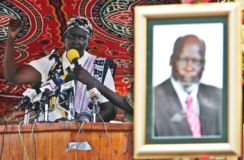Garang’s widow has doubts on his helicopter crash
Nov 11, 2005 (JUBA) — Juba is the capital and largest city in southern Sudan. It’s also a place with no electrical grid, virtually no running water and the only paved road within a couple hundred miles. For a half century this has been a place of war, not development.
 After at least two million deaths, the latest war formally ended on July 9 of this year, as rebel leader John Garang became the vice president of Sudan in a comprehensive peace agreement brokered in large part by the United States. Twenty-one days later, Garang was dead — killed in a helicopter crash as he was flying back to Sudan from a meeting with the president of Uganda.
After at least two million deaths, the latest war formally ended on July 9 of this year, as rebel leader John Garang became the vice president of Sudan in a comprehensive peace agreement brokered in large part by the United States. Twenty-one days later, Garang was dead — killed in a helicopter crash as he was flying back to Sudan from a meeting with the president of Uganda.
In Juba, I met with Garang’s widow, Rebecca Garang. When riots broke out after her husband’s death, Garang almost single-handedly kept Sudan from descending back into war. Southern Sudanese immediately saw the accident as a plot by the government in Khartoum. But Rebecca Garang appealed for calm, urged people to wait for a formal investigation and suggested that the official explanation of Garang’s death was probably correct: the helicopter crash was an accident caused by bad weather. Now Garang tells us she is not so sure.
“An accident had happened,” she said. “But the way the accident happened was very funny.”
“What was funny about it?”
“They went a long way from Uganda and then the accident happened at the border. Yes, it was bad weather, but it was not weather which can make a helicopter crash. So this is what I want to know. What happened inside the helicopter? Was there a mechanical problem?”
On the rugged streets of Juba, everybody I talked to blames the government for John Garang’s death, but Garang does not make that accusation. She is stoically waiting for the results of an international investigation.
“If somebody implemented a plan to kill my husband, I would say that God made it that way. … But I want law to get its course so that I know what happened. Was it natural? Was there somebody behind it? I can’t say until I know what happened. I need to know for sure what has happened.”
Garang has had no time to mourn her husband’s death. She’s the guardian of her husband’s vision of a modern and developed southern Sudan finally at peace. She’s also the minister of roads and transportation. The south’s sole paved road only runs about two miles and is full of potholes; she knows she has a long way to go.
“You have seen Juba,” she said. “It is a very beautiful city. What we need is just to build it. But to start to build the city we need to build the roads.”
We stayed in camp on the banks of the beautiful White Nile River. Here we had luxuries most of the residents of Juba have never had: Our tents were equipped with generator-powered electricity and a fan. There was no plumbing here, but we did have outdoor showers, the water pumped in from the river and filtered. After a day in the dusty squalor of Darfur, this was one of the most refreshing showers I’ve ever had.
At the end of the interview, I asked Rebecca Garang what Juba will look like in 10 years.
Her dream, she said, is for Juba to look like Kansas City, a place she got to know when her husband was getting his doctoral degree from Iowa State University in the late 1970s.
“My husband and I lived in the Midwest. I lived in Iowa. We traveled to Kansas City. It is beautiful.”
(ABC News)
